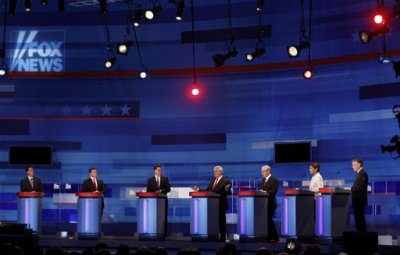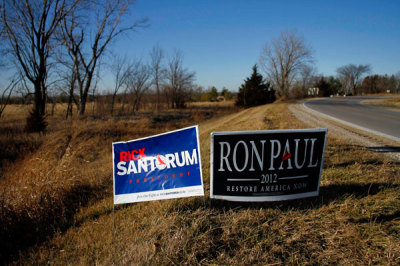CP Analysis: Christian Right Not Backing a Single Candidate (And That's Not Unusual)
“Who will the Christian right back?” is a recurrent question among media pundits in Republican presidential nomination contests. But, the Christian right, torn by principle versus pragmatism, has never coalesced around a single candidate.


The question itself is based upon the faulty assumption that the Christian right is a top-down hierarchical organization. The Christian right is a social movement and, like any social movement, has multiple leaders. Also, like any social movement, it must contend with the principle versus pragmatism dilemma: do you back the candidate you most agree with, or do you back the candidate that has a chance to win the nomination and the general election?
Evidence of mobilized Christian voters began to emerge in the 1976 election. Georgia Governor Jimmy Carter, a Democrat, gained the support of evangelicals who were anxious to elect one of their own. Four years later would be the first election in which the modern Christian right, dubbed the “New Christian Right” at the time, would get organized. It would be the Republican Party, though, reaching out to include conservative Christians in their coalition.
Republican operative Paul Weyrich went to Tennessee preacher Jerry Falwell and suggested that a “moral majority” of conservative evangelical Protestants, mainline Protestants, Catholics and Jews could become important influencers in national politics if they became organized. Falwell bought into the idea and formed Moral Majority.
The relationship would be mutually beneficial. The Republican Party would gain voters who had previously not voted at a high rate, and voted for Democrats when they did. The Christian right would gain a seat at the table and a voice in public policy.
Throughout the 1980s, other Christian right organizations would form and other leaders would emerge, such as Tim LaHaye, James Robison and Pat Robertson. While these different organizations shared many of the same public policy goals, they sometimes differed on methods, or how to achieve those goals.
This became evident in the 1988 Republican presidential nomination contest. The Christian right had one of its own, Pat Robertson, running for president. Yet, Falwell endorsed George H. W. Bush. Pragmatism trumped purity. (The fact that Robertson is a charismatic Christian, and Falwell is from a Baptist tradition that views charismatics with suspicion may have played a role as well.)
In the 1994 midterm elections, the Christian right helped the Republican Party take control of Congress for the first time since the 1950s. Just two years later, however, none of the Republican presidential candidates brought much excitement to the Christian right. To outsiders, Pat Buchanan would seem to be the candidate of choice after his fiery “culture wars” speech at the 1992 Republican convention. Christian right leaders were concerned, however, about his lack of support for Israel. Sen. Bob Dole won the nomination but did not show much interest in social conservative causes and lost in the general election.
The 2000 presidential nomination contest again saw one of the Christian right's own leaders run. Gary Bauer was the head of Family Research Council, which became the most prominent Christian right organization after the demise of Moral Majority in the late 1980s and decline of the Christian Coalition in the late 1990s. Bauer did not receive much support for his campaign, though, among other Christian right leaders, who calculated that he was a long-shot to win the nomination.
Early on, most Christian right leaders did not immediately gravitate to George W. Bush either. They were concerned that Bush would be like Dole or his father, George H. W. Bush, and not take their concerns seriously. Bush reached out to them, though, and convinced many that he was on their side. After Bauer left the race, however, he endorsed Bush's chief rival – Sen. John McCain.
Christian right leaders split their support in the 2010 Republican presidential nomination race again as well. Weyrich backed Mitt Romney. Michael Farris, head of the Home School Legal Defense Association, endorsed former Arkansas Governor Mike Huckabee. Family Research Council did not make an endorsement, though some of its staff took a leave of absence to join the Huckabee campaign. James Dobson, head of Focus on the Family at the time, withheld an endorsement until Mitt Romney dropped out of the race and John McCain had an almost insurmountable lead, at which point, he endorsed Huckabee.
In perhaps the biggest surprise endorsement and best example of pragmatism trumping purity, Pat Robertson supported former New York City Mayor Rudy Giuliani, who is pro-choice and in favor of gay marriage. Though Giuliani did not accrue many delegates, at the time of Robertson's endorsement he was leading in national polls and many pundits thought he would be the eventual nominee.
One thing that is different about the current race, however, is that the Christian right has more choices than it has in the past. Many of the candidates, such as, Michele Bachmann, Newt Gingrich, Ron Paul, Rick Perry, Rick Santorum, and Herman Cain (before he dropped out), have all been espousing views favorable to conservative Christians.
Some argue that the Christian right's lack of support for a single candidate is a sign of weakness for the movement. Paul Waldman, contributing editor for The American Prospect, argued, in an article titled “The Continued Decline of the Religious Right,” that because the Christian right does not have only one candidate it can coalesce around, it has become irrelevant in the Republican nomination process.
The fact that all the candidates, to one degree or another, are seeking the support of the Christian right should be seen as a sign of strength, though, not weakness. Even Romney, who can arguably be considered the least favorable to the Christian right, spoke at the Values Voter Summit and has emphasized the values he holds in common with them.
In an Oct. 10 interview with The Christian Post, Family Research Council President Tony Perkins said that any of the candidates will have the support of social conservatives in the general election. “Barack Obama has been the best coalition builder conservatives have ever had. Whoever gets the nomination is going to have a lot of support among social conservatives.”
For further reading:
Martin, William. 1996. With God on Our Side: The Rise of the Religious Right in America. New York: Broadway Books.
Moen, Matthew C. 1989. The Christian Right and Congress. Tuscaloosa, AL: The University of Alabama Press.

 The Christian Post Daily Report 12.27.11
The Christian Post Daily Report 12.27.11


























